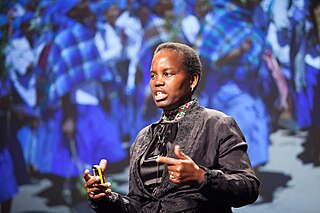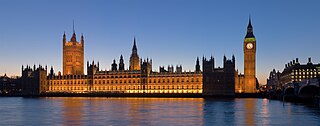Related Research Articles

An unlawful combatant, illegal combatant or unprivileged combatant/belligerent is a person who directly engages in armed conflict in violation of the laws of war and therefore is claimed not to be protected by the Geneva Conventions. The International Committee of the Red Cross points out that the terms "unlawful combatant", "illegal combatant" or "unprivileged combatant/belligerent" are not defined in any international agreements. While the concept of an unlawful combatant is included in the Third Geneva Convention, the phrase itself does not appear in the document. Article 4 of the Third Geneva Convention does describe categories under which a person may be entitled to prisoner of war status. There are other international treaties that deny lawful combatant status for mercenaries and children.

Unity Dow is a Motswana lawyer, human rights activist, specially elected member of parliament, and a writer. She formerly served as a judge on the High Court of Botswana and in various Botswana government ministries. Born in the Bechuanaland Protectorate to a seamstress and a farmer, who insisted on their children obtaining an education, Dow grew up in a traditional rural village before modernisation. She earned a law degree in 1983 from the University of Botswana and Swaziland, though her studies were completed in Swaziland and University of Edinburgh, Scotland, as Botswana had no law school at the time. After her graduation, Dow opened the first all-woman law firm in Botswana and in 1997 became the first woman to be appointed as a judge to the country's High Court.

Lesbian, gay, bisexual, and transgender (LGBT) people in Botswana face legal issues not experienced by non-LGBTQ citizens. Both female and male same-sex sexual acts have been legal in Botswana since 11 June 2019 after a unanimous ruling by the High Court of Botswana. Despite an appeal by the government, the ruling was upheld by the Botswana Court of Appeal on 29 November 2021.
Redfearn v Serco Ltd [2006] EWCA Civ 659 and Redfearn v United Kingdom [2012] ECHR 1878 is a UK labour law and European Court of Human Rights case. It held that UK law was deficient in not allowing a potential claim based on discrimination for one's political belief. Before the case was decided, the Equality Act 2010 provided a remedy to protect political beliefs, though it had not come into effect when this case was brought.
Article 3 of the European Convention on Human Rights prohibits torture, and "inhuman or degrading treatment or punishment".
Article 3 – Prohibition of torture
No one shall be subjected to torture or to inhuman or degrading treatment or punishment.
Although Senegal is a relatively underdeveloped country, HIV prevalence in the general population is low at around 0.08 per 1000 people, under 1% of the population. This relatively low prevalence rate is aided by the fact that few people are infected every year – in 2016, 1100 new cases were reported vs 48,000 new cases in Brazil. Senegal's death due to HIV rate, particularly when compared it to its HIV prevalence rate, is relatively high with 1600 deaths in 2016. Almost two times as many women were infected with HIV as men in 2016, and while almost three times as many women were receiving antiretroviral therapy (ARV) as men, only 52% of HIV positive people in Senegal received ARV treatment in 2016.

Lesbian, gay, bisexual, transgender and queer (LGBTQ) people face difficulties in prison such as increased vulnerability to sexual assault, other kinds of violence, and trouble accessing necessary medical care. While much of the available data on LGBTQ inmates comes from the United States, Amnesty International maintains records of known incidents internationally in which LGBTQ prisoners and those perceived to be lesbian, gay, bisexual or transgender have suffered torture, ill-treatment and violence at the hands of fellow inmates as well as prison officials.
Farmer v. Brennan, 511 U.S. 825 (1994), was a case in which the Supreme Court of the United States ruled that a prison official's "deliberate indifference" to a substantial risk of serious harm to an inmate violates the cruel and unusual punishment clause of the Eighth Amendment. Farmer built on two previous Supreme Court decisions addressing prison conditions, Estelle v. Gamble and Wilson v. Seiter. The decision marked the first time the Supreme Court directly addressed sexual assault in prisons.
Attorney General of Botswana v. Unity Dow was a landmark decision of Botswana's Court of Appeal. The case upheld the decision brought to the High Court of Botswana, by the lawyer, Unity Dow, who would go on to become a judge on the High Court and a government minister. It declared provisions of the 1984 Citizenship Act, which barred children from receiving nationality from their mothers, to be unconstitutional. It resulted in the passage of the 1995 Citizenship Act of Botswana, which eliminated gender disparities in the law. The case sparked women to press for changes to nationality laws across Africa.
Bounds v. Smith, 430 U.S. 817 (1977), was a United States Supreme Court case in which the Court tested the basic constitutional right of prison inmates’ access to legal documents prior to court. Prison authorities would consequently be required to provide legal assistance or counsel to inmates, whether it be through a trained legal professional or access to a legal library. Multiple prisoners alleged that they were denied access to the courts due to lack of an adequate legal library and assistance with court related documents.

Secretary of State for Foreign and Commonwealth Affairs v Yunus Rahmatullah [2012] UKSC 48 is a UK constitutional law case concerning the detention of Yunus Rahmatullah, a Pakistani citizen detained in Iraq, and later Afghanistan, who is alleged to have travelled to Iraq to fight for Al-Qaeda during the Second Iraq War.

Mariëtte Sonjaleen Bosch was a South African woman who was executed in Botswana on 31 March 2001. Bosch was convicted for the murder of Maria Magdalene "Ria" Wolmarans, both members of the white expatriate community in Gaborone, in June 1996. She was the first white woman to be executed in Botswana, and was the fourth woman to be hanged since the country's independence. Due to these two factors, the murder case received significant attention outside the country and was referred to as "Botswana's White Mischief".
Zealand v Minister of Justice is an important case in South African constitutional law.

Taunoa v Attorney-General was a case in the Supreme Court of New Zealand concerning breaches of prisoners' Bill of Rights protected rights by the Department of Corrections in the Behaviour Management Regime programme at Auckland Prison between 1998 and 2004.
The Lesbians, Gays & Bisexuals of Botswana (LEGABIBO) is a Botswana human rights advocacy group with the primary objective of seeking legal and social rights for the LGBT community in Botswana. It is the first LGBT focused organization to be registered in Botswana after years of official opposition. The organization aims to reduce discrimination of LGBT individuals and advocate the recognition of same sex couples for the purpose of adoption, accessing social benefits and same-sex marriage.
Ancestral land conflict over the Central Kalahari Game Reserve (CKGR) arose in the 1970s between the government of Botswana and the San people (Bushmen), and is ongoing, resulting in one of the most expensive court cases in the history of Botswana.
Botswana held a general election in October 2019. Though it was more competitive than previous elections, it resulted in a victory for the ruling Botswana Democratic Party (BDP) and won an addition term for President Mokgweetsi Masisi. Botswana saw an escalation in the rivalry between Masisi and his predecessor Ian Khama, with Khama leaving the Botswana Democratic Party to support the Botswana Patriotic Front and the Umbrella for Democratic Change. Following the BDP's victory, opposition leaders challenged the results of the election.

R. v Secretary of State for the Home Department was a case decided on 3 November 2005 by the UK House of Lords that determined whether or not a delay in initiating an application to seek asylum limited an individual from receiving access to state relief. Furthermore, the case questioned whether this denial of state relief constituted a breach of the European Convention on Human Rights 1950 ('ECHR').

The High Court of Botswana is the highest court of Botswana. It is based in Gaborone with branches in Lobatse, Francistown, and Maun. It operates above the Magistrates' Courts of Botswana, but below the Appeal Court. The High Court is headed by the Chief Justice of Botswana.

Gt v Kao[2007] IESC 55; [2008] 3 IR 567 is an Irish Supreme Court case which upheld the High Court's decision that, under article 3 of the Hague Convention on the Civil Aspects of Child Abduction, the appellant had acted unlawfully in taking her two children outside of Ireland without permission from the respondent.
References
- ↑ Wongai Zhangazha (2014-06-20). "HIV+ Zim prisoners take Botswana to court". Zimbabwe Independent. Retrieved 2014-12-04.
- ↑ Victor Baatweng (2014-08-10). "Botswana in legal battle with foreign inmates". Al Jazeera. Retrieved 2014-12-04.
- ↑ Thamani Shabani (2014-06-12). "Court reserves judgement in ARV case". Botswana Daily News. Archived from the original on 2015-09-23. Retrieved 2014-12-04.
- ↑ Mthokozisi Dube (2014-08-23). "Botswana inmates to get ARVs". The Chronicle. Retrieved 2014-12-04.
- ↑ SABC News (2014-06-10). "Botswana court to hear arguments in ARV treatment case" . Retrieved 2014-12-04.
- ↑ Al Jazeera (2014-08-23). "Botswana to pay for all inmates' HIV drugs" . Retrieved 2014-12-04.
- ↑ Godfrey Ganetsang (2014-08-25). "High Court orders Botswana to provide foreign inmates with ARVs". Sunday Standard. Retrieved 2014-12-04.
- ↑ Mpho Tebele (2014-10-20). "Bots appeals against giving foreign inmates ARVs". The Southern Times. Retrieved 2014-12-05.